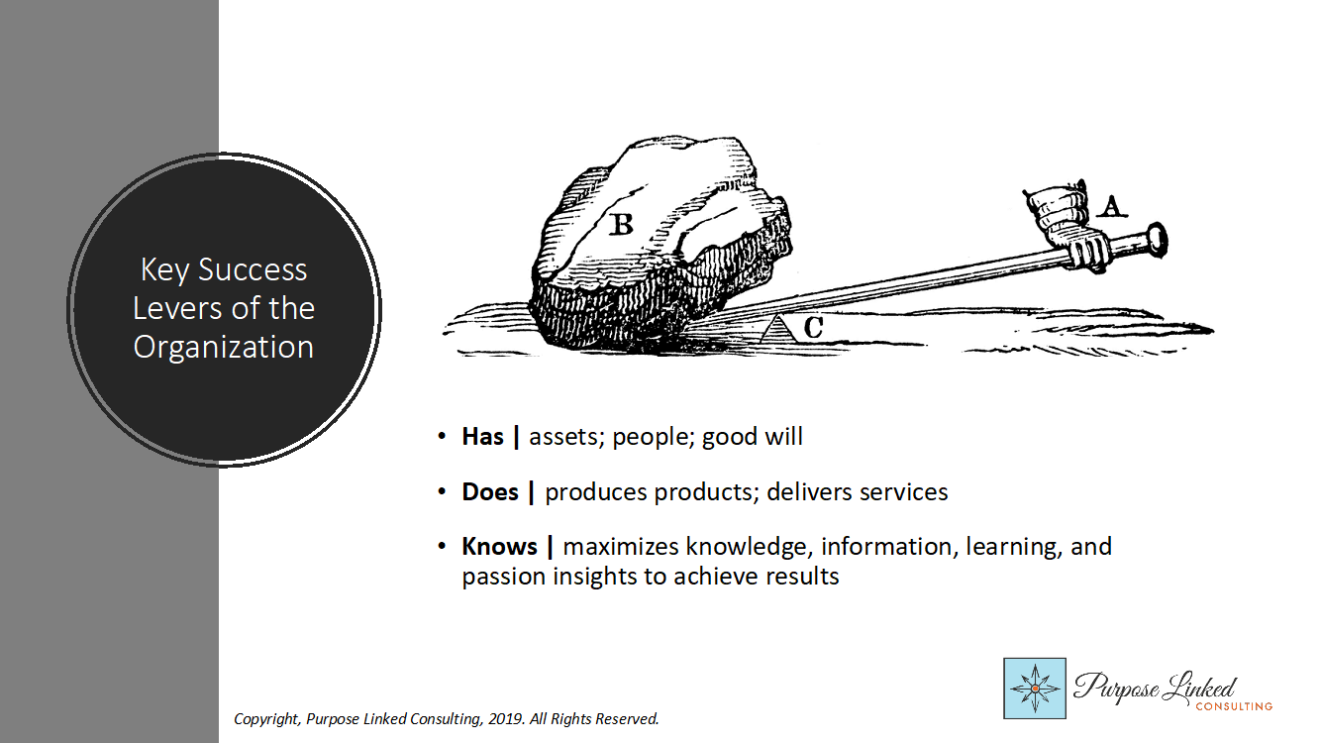Regardless of the entity, every organization has access to the same three levers for success.
As a leader, you can help your company capitalize on its assets, the skills of employees and the value of the good will the organization has earned with customers, the industry and in the market. You can also leverage what your company does, by producing better products or delivering better services than your competitors. But, leveraging the knowledge developed within the organization, especially the diverse knowledge of individuals on your team and the unique perspectives that different passions offer, is perhaps the most powerful weapon in your arsenal for success.
This fact became particularly evident recently when I worked with an executive team from a large biotech company. They’d been struggling with solving three major strategic issues, and efforts thus far had done little more than generate frustration and resentment among team members.
As an experiment, the CEO and I decided to separate the executives into three teams, each assigned to work on the business issues central to the company’s ongoing success. These included topic areas such as cultural integration of a newly acquired company; solving a manufacturing capacity issue; and sourcing diverse talent for a rapidly expanding division.
The approach pushed the executives outside of their comfort zone by requiring that they form teams comprised of more than “the usual suspects” — more than the individuals whose job roles related to the specific issues under discussion.
Not surprisingly, the idea of expanding the project team composition was at first met with skepticism.
“What do I know about manufacturing processes?” David inquired. “I’m the legal counsel for the company. My job is to protect the company and keep us out of legal jeopardy.”
It was true that David had a point. He was trained as an attorney. Yet, focusing only on his technical area of expertise left untapped the unique set of passions he has — powerful aspects of David’s personality that expand the insights he can glean from any challenge he contemplates.
David has a “discoverer” passion, which makes him particularly adept at digging into an issue, uncovering hidden facts and validating ideas. When he applied that passion to the manufacturing capacity problem, David was able to help the team quickly identify a major sourcing block and uncover a facilities design issue that were at the root of the problem.
Randy, the head of business development, has a “conceiver” passion. He thrives best when challenged to innovate, to develop and explore out-of-the-box ideas. He generates his most groundbreaking concepts when working with others as the ‘devil’s advocate’ and challenging conventional thinking.
“I’ve only invited Randy to my meetings when I had a specific issue that he and his team could solve,” said Lisa. “Now I realize that I should invite him to all of my staff meetings. His ideas today made a huge difference with our progress on sourcing diverse employees for our manufacturing facilities and stemming the hemorrhage of talent being recruited away from the that company we recently acquired.”
The teams advanced more on the strategic issues in three hours than they had in months of struggling because they worked together across silos, beyond functional roles and responsibilities, and embraced the diversity of thought that passions provide.
What they had done during the experiment was capitalize on one of the three major levers that organizations have at their disposal for success: how knowledge gets generated and utilized. The individual passions of each team member contributed immensely to their results.
Here are the diverse perspectives available from the 10 key passion archetypes on your team, which can provide important support for solving business challenges:
It’s worth taking time to understand the deeper aspects of personality, in the form of the passions of the people you’re leading. Leveraging those passions by mining for their diverse perspectives, especially when trying to solve strategic challenges, offers a competitive advantage that skills alone can’t beat.
Alaina Love is CEO of Purpose Linked Consulting and co-author of “The Purpose Linked Organization: How Passionate Leaders Inspire Winning Teams and Great Results” (McGraw-Hill). She is a recovering HR executive, a global speaker and leadership expert, and passionate about everything having to do with, well … passion. Her passion archetypes are Builder, Transformer and Healer. You can learn more about how to grow leaders, build passionate teams and leverage passion to create great customer outcomes here.
When she’s not working with her Fortune 500 client base, Love is busy writing her next book, “Passionality, The Art and Science of Finding Your Passion and Living Your Bliss,” which explores the alignment of personality, purpose and passion, and the science of how it contributes to our well being. Follow Love on Twitter, Facebook, YouTube or her blog.
If you enjoyed this article, sign up for SmartBrief’s free e-mails for workplace leaders, among SmartBrief’s more than 200 industry-focused newsletters.
